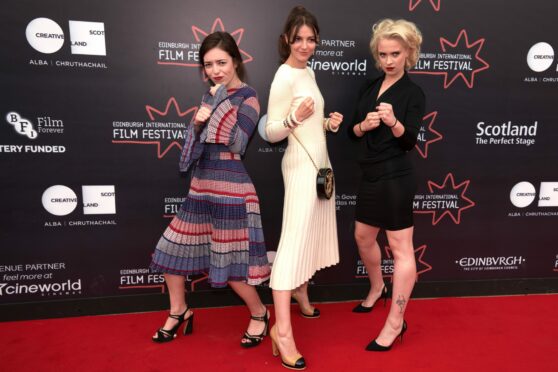
Arts and culture across Scotland, from community centres to major festivals, are in peril as a storm of funding cuts, energy bills and low ticket sales hammers the sector.
Fears that staff will be lost and venues shattered are climbing after the Edinburgh International Film Festival, the city’s Filmhouse and the historic Belmont cinema in Aberdeen plunged into administration.
Creative Scotland has warned that a quarter of the 121 organisations funded could be lost by the end of the year as arts centres and cultural hubs reveal deepening concern. Rebecca Atkinson-Lord, chief executive and artistic director of An Tobar and Mull Theatre on the Isle of Mull, warned it is struggling to survive.
“We’ve told Creative Scotland we can’t continue unless we have an uplift in the new funding round at the start of the next financial year,” she said. “It also depends on how big our energy bills are. It’s looking like it’s going to go from about £865 a month to in excess of £3,000.
“That rise is £25,000 a year – the equivalent of our entire associate artists programme budget or our entire visual arts budget or our entire music programme budget. We can close one of our buildings if we need to and move people into a smaller space to keep the functionality of our operations, so we’re only heating one space. I’m optimistic we can be smart and tighten our belts enough to make it through the next three to six months but after that I don’t know how I retain staff or continue producing.”
Mareel, the UK’s most northerly cinema and arts centre, which is part-funded by Creative Scotland, has closed one day a week in a bid to cut costs. It is run by Shetland Arts, which also oversees the Garrison Theatre and Bonhoga Gallery. Chief executive Graeme Howell said: “How we’re going to square the circle of increasing prices with people’s ability to spend money is going to be a taxing challenge. There’s a lot of concern about how it plays out.”
Howell, whose organisation employs 80 people, added: “Am I going to ask funders for more money? Of course. And they’ll probably say no.”
Kate Grenyer, director of arts organisation Fife Contemporary, which also receives funding from Creative Scotland, said: “As emergency funding is channelled towards venues at greater risk, the pool of money from which we can bid to fund our programme becomes reduced.
“As such, the amount of cultural activity that is happening in communities and in art galleries will inevitably go down and without additional funding, and even with these funds redirected to help, there are still bound to be organisations that are lost for good, and the rest of us will be stripping our programme back to the minimum to survive.
“There are also individual artists who have stopped being able to make work – either they can’t afford the bills for their studios, to run vehicles – and some artists who have particularly energy-intensive processes such as metal casting, or heating glass or ceramic kilns have stopped making work completely. The sector is an eco-system and every part is affected.”
In Falkirk, the town hall is to close while the Modern Two art gallery in Edinburgh closed for winter. Meanwhile, the sustainability of Scotland’s showpiece summer arts festivals is also at risk. Edfest.com, representing eight venues in the capital, said ticket sales this year were down 25% compared to 2019, which the organisation said was a “major threat” for everyone involved.
Comedian and activist Kate Smurthwaite, a former board member of Edinburgh Festival Fringe Society, said: “The Edinburgh Fringe faces multiple threats at the moment. The cost of living crisis is definitely a big factor. For me, and almost every act I know, 2022 was one of the toughest Fringes ever. Audiences were down, sales were down, and financial contributions were down.
“It seems inevitable that fewer and fewer artists will be able to afford to come to the festival and those that do will be looking at shorter runs, fewer shows, fewer one-off events, less experimental work. It’s a perfect storm of destruction for the arts sector.”
Labour MSP Sarah Boyack last week urged ministers to urgently review financial support for at-risk venues. She recently hosted a meeting of 30 groups to discuss the crisis. “They all painted a very grim picture,” she said. “Their consensus was that they need support.”
Creative Scotland said it would find out its budget on December 15, when the Scottish Government Budget for 2023/24 is published.
Culture Minister Neil Gray said: “This is an incredibly worrying time for the culture sector and the Scottish Government is engaging with Creative Scotland and other relevant organisations to provide support where possible for those organisations facing immediate challenges.
“The Scottish Government has committed to an emergency budget review to assess all opportunities to redirect additional resources to those most in need, reduce the burdens on business and stimulate the Scottish economy.
“The recent unwelcome and unnecessary delay to the UK Government’s budgetary plans is creating more economic uncertainty at a time when households, businesses and the wider economy need as much stability as possible.”

Enjoy the convenience of having The Sunday Post delivered as a digital ePaper straight to your smartphone, tablet or computer.
Subscribe for only £5.49 a month and enjoy all the benefits of the printed paper as a digital replica.
Subscribe